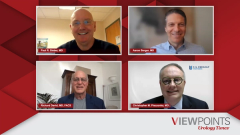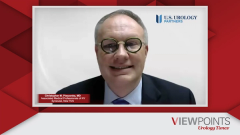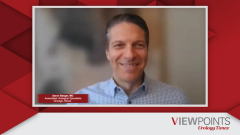
Overcoming Staffing Challenges and Turnover in Urology Practices
Expert panelists share their perspectives on recent challenges with staffing and turnover in their urology practice and consider how these particular barriers may be overcome, including recruiting and hiring additional advanced practice providers.
Episodes in this series

Transcript:
Paul R. Sieber, MD: So, Richard, now you’re in trouble. So, I think we all loved your idea about 6-month injectables leading to [fewer] mistakes. And I think we all love the idea that the patient gets dosed correctly, insurance, less hassles. So, since you’re so enlightening to give us an idea about that, I was tasked with 1 last question, and that is: We’ve all brought up staff shortages, staff shortages, staff shortages. So I was tasked to ask everybody: What’s your solution for turnover burnout and bringing in new staff? So, Richard, you were so enlightening on the 6-month idea.... So do you have any exciting ideas to share with us about what you do about staff turnover and what you’re doing to fix it on the West Coast?
Richard David, MD, FACS: I think we’re doing what every company does. We offer our current employees rewards for referring...an employee who actually starts work. I think, we’ve got all these people in HR [human resources] [who] are trying to do things to keep our employees as happy and as satisfied as possible. Physician burnout is a much harder issue that we struggle with, too, and I don’t have any great answers for. I’m hoping you guys are going to educate me now.
Paul R. Sieber, MD: So, Aaron, what are you doing in Chicago to have people [so eager] to join your practice, whether they’re staff or physicians, that they’re just flocking to come to see you in Chicago? Or are you stuck? I don’t have a magic answer either.
Aaron Berger, MD: Well, I don’t think I have a magic answer, but I think along those lines...it’s a big process and a lot of time and effort to onboard new staff. And I’m sure we’ve all had situations where you bring someone on, you train them, you go through the whole company handbook, you educate them on how to do the EMR [electronic medical record] and how to do all the charting and workflows and that, and they’re there for 2 weeks and then they disappear and never come back. We had a person who went for their lunch break after being on the job for 6 days and never came back. So that was a long lunch. So it’s a challenge. So certainly, retaining those [whom] you have, we’ve really tried to implement a good company culture, as far as doing little extra things for the staff, bringing ice cream trucks to the offices, periodically—we had a big holiday party—we’re having a big corporate practice-wide summer picnic for everyone and their family this summer. Stuff like that just to show that we appreciate everybody and that we’re happy they’re there and they’re happy that they’re working at our practice.
But it still is hard to find new people. So, when people retire, people move on, or they relocate or whatever, it’s still very challenging. I think we had medical assistant physicians, we still have some posted, but we had some looking for 4 or 5 medical assistants. We literally had no one we could find to bring in for almost 6 months and now we’ve fortunately hired 3 or 4, but...they don’t have a lot of urology experience. They’re still learning. So it’s not like you can just plug them in and say go, like you would [with] an experienced medical assistant or nurse. So, it’s a constant struggle and we’re all getting busier and seeing more patients to try to get everybody in. So it’s going to be a persistent problem. I wish I had a magic solution, but certainly if we fix the reimbursement issue, I think that was a topic for later, and can pay our staff more without compromising everything else, then that would go a long way. But at least be competitive with the hospitals [whose] reimbursements only keep going up.
Christopher M. Pieczonka, MD: Yeah, exactly.
Paul R. Sieber, MD: So where are they up in Upstate New York, Chris? Things are easy up there?
Christopher M. Pieczonka, MD: No, but I really completely concur with...the situation from the ancillary staff. We’ve had an unanticipated...acute physician problem. So we have 25 [physicians].... Three acutely had...permanent medical disability, basically. And that’s really forced us to rethink how we keep those patients within our practice. So, we’re trying something new, or we will be trying something new—this is going to go into effect in the next couple of months—of having an office that used to be staffed by 2 physicians be staffed with nurse practitioners only. And we are assigning a dedicated staff physician to be able to be doing video visits and being available to be essentially at arm’s length through the internet for the nurse practitioners there to keep the referrals coming, to keep the office open, because we just don’t have extra staff to send there. Recruiting physicians has been a difficult time for everybody. And the way it...works, if you swing and you miss on this...resident cycle, then there’s no chance until...the next...summer. And so, it’s a little bit of a different staffing model. I was always very skeptical about that because I thought that the anesthesiologists...let the CRNAs [certified registered nurse anesthetists]...take over their landscape. I now see how...having the ancillary staff and advanced practice providers [APPs] may be actually good for our business. So, it’s a really different paradigm. You can...touch base with me maybe next year. I’ll let you know if it was a good idea or a bad idea, but that’s how we’re trying to deal with that.
Paul R. Sieber, MD: Yeah, I think when you see the Department of Labor saying we’re the most stressed occupation—people say physicians when I tell them that—I say, no, it’s urologists. And I think it’s exclusively attributed [to how] we don’t have enough [staff]. So, then we’re struggling to get APPs, and guess what. They need to be trained. So, our latest adventure for us is to bring in some APPs to do night call.
Christopher M. Pieczonka, MD: Oh, really?
Paul R. Sieber, MD: So we’re going to actually have 2 night call APPs and see if that at least lessens the burden on call. I know I stepped down from call this year after doing it for forever, and it’s been a major hassle for the group when it’s down to [fewer] guys taking call. We had one sudden loss from Lou Gehrig [disease (amyotrophic lateral sclerosis)]. So, when you go down a few [staff members, you’re suddenly really, really pinched. So, I think we all struggle with the same thing. There are no easy answers, and [we] certainly have the other hassles of daily life and patients who are sick. It gets to be a struggle.
Transcript is AI-generated and edited for clarity and readability.
Newsletter
Stay current with the latest urology news and practice-changing insights — sign up now for the essential updates every urologist needs.










